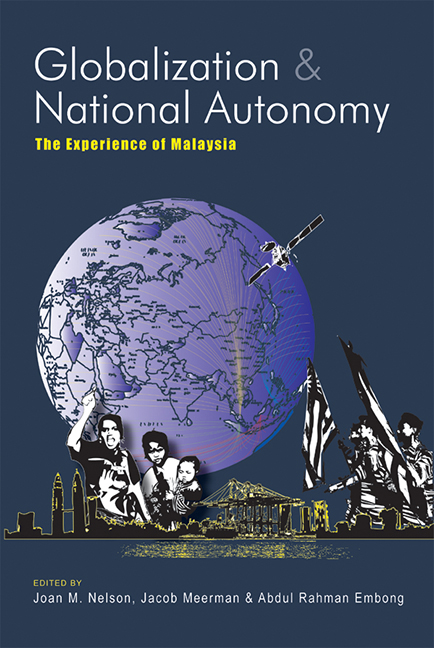Book contents
- Frontmatter
- Contents
- List of Abbreviations
- List of Tables and Figures
- Preface
- Contributors
- Chapter 1 Introduction
- Chapter 2 Developmentalist State in Malaysia: Its Origins, Nature, and Contemporary Transformation
- Chapter 3 The Look East Policy, the Asian Crisis, and State Autonomy
- Chapter 4 The Malaysian Success Story, the Public Sector, and Inter-ethnic Inequality
- Chapter 5 Poverty Eradication, Development, and Policy Space in Malaysia
- Chapter 6 Trade Liberalization and National Autonomy: Malaysia's Experience at the Multilateral and Bilateral Levels
- Chapter 7 Malaysia's Education Policies: Balancing Multiple Goals and Global Pressures
- Chapter 8 Malaysia's Healthcare Sector: Shifting Roles for Public and Private Provision
- Chapter 9 Globalization, Islamic Resurgence, and State Autonomy: The Response of the Malaysian State to ‘Islamic Globalization’
- Chapter 10 The National Culture Policy and Contestation over Malaysian Identity
- Chapter 11 Conclusions
- Index
Chapter 7 - Malaysia's Education Policies: Balancing Multiple Goals and Global Pressures
Published online by Cambridge University Press: 21 October 2015
- Frontmatter
- Contents
- List of Abbreviations
- List of Tables and Figures
- Preface
- Contributors
- Chapter 1 Introduction
- Chapter 2 Developmentalist State in Malaysia: Its Origins, Nature, and Contemporary Transformation
- Chapter 3 The Look East Policy, the Asian Crisis, and State Autonomy
- Chapter 4 The Malaysian Success Story, the Public Sector, and Inter-ethnic Inequality
- Chapter 5 Poverty Eradication, Development, and Policy Space in Malaysia
- Chapter 6 Trade Liberalization and National Autonomy: Malaysia's Experience at the Multilateral and Bilateral Levels
- Chapter 7 Malaysia's Education Policies: Balancing Multiple Goals and Global Pressures
- Chapter 8 Malaysia's Healthcare Sector: Shifting Roles for Public and Private Provision
- Chapter 9 Globalization, Islamic Resurgence, and State Autonomy: The Response of the Malaysian State to ‘Islamic Globalization’
- Chapter 10 The National Culture Policy and Contestation over Malaysian Identity
- Chapter 11 Conclusions
- Index
Summary
Well before Malaysia gained her independence, education policies were the focus of intense debates and considerable political conflict. Virtually all groups viewed expanded and improved education as a paramount factor driving the new nation's development, combating poverty, staffing and expanding vital government services, and creating a modern society. The education system was also regarded as a key means to three additional and equally important goals:
• As the Introduction to this volume briefly notes, during the period leading up to Independence, creating national unity while respecting diverse cultural legacies was a crucial challenge. Equally clearly, the education system potentially could play a central role in encouraging unity. But Malay and Chinese leaders held opposed views on how best to approach this goal.
• Implicitly before 1970, and explicitly under the New Economic Policy (NEP), education was also viewed as the main means to narrow the differences among ethnic groups in income and occupational structure.
• In Malay tradition reaching back to pre-colonial days, education was inextricably linked to Islamic religious instruction. This goal was given modest recognition at the time of independence, but from the late 1970s it became increasingly important.
The evolution of the education sector in Malaysia is in large part a story of interactions and changing priorities among these four goals, and of conflicting definitions of their meanings. External pressures and influences have changed over time, and bear differently on different goals. The searches for national unity and for means to narrow the ethnic gap spring from and respond to fundamental domestic concerns. In contrast, the role of education in generating knowledge and skills for an increasingly complex economy has always been influenced to some degree by the needs and demands of foreign investors and trading partners and the requirements for transferring technology. Initially, however, education was seen to serve Malaysia's internal development. As the economy became more complex and more integrated with the global economy, and as international economic competition intensified, the goal of providing human resources for development increasingly focused on building capacity to compete successfully in international markets.
- Type
- Chapter
- Information
- Globalization and National AutonomyThe Experience of Malaysia, pp. 189 - 217Publisher: ISEAS–Yusof Ishak InstitutePrint publication year: 2008

